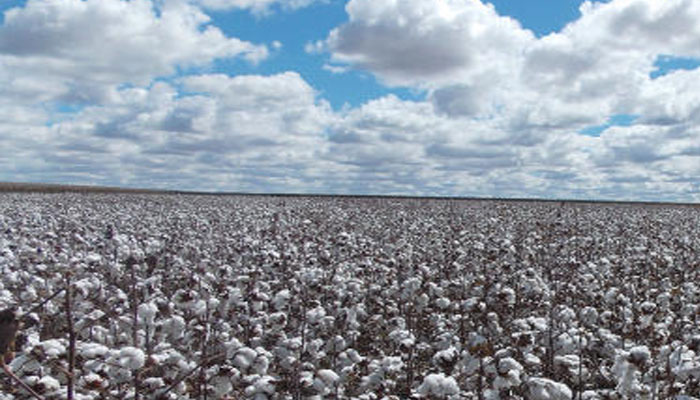Production shortfalls push cotton price to 11-year high
Karachi Cotton Brokers Forum Chairman Naseem Usman said that cotton priced traded at Rs12,000/maund, which was the highest in 11 years.
KARACHI: Cotton prices peaked to an 11-year high on Wednesday, while spot rate moved up to an all-time high cotton trade history in Pakistan, traders said, attributing it to decline in total production.
Karachi Cotton Brokers Forum Chairman Naseem Usman said that cotton priced traded at Rs12,000/maund, which was the highest in 11 years. Spot rate moved up to Rs11,700/maund by the spot rate committee of Karachi Cotton Association on Wednesday, which was highest price in the history of cotton trade in Pakistan.
An increase of Rs400 was recorded in the spot rate. Ex-Karachi spot rate was raised to Rs11,880/maund after addition of Rs180 as upcountry expenses. Usman said that prices moved up because of a critical decline in cotton production. Prices also remained higher in the international market.
New York Cotton Futures recorded an increase of 10 cents to 94 cents per pound, which was also a higher level in several years.
Cotton production in Pakistan has been recorded at 5.6 million bales only, which was the lowest level in 30 years, against mill consumption of around 15 million bales.
Pakistan would have to import around 8.0 million bales that would cost around $4 billion to the country when cottonseed, oil and other by-products were included. This would add to the country’s import bill.
Usman said the government did not have any concrete strategy to increase cotton production in the country, which was a matter of grave concern. Sugarcane and other cash crops had replaced cotton in several cotton growing areas of Sindh and Punjab, as substandard seed and pesticides had compelled farmers to move to other crops.
One stakeholder said that cotton production had increased in 2008-9 due to cultivation of BT cotton, which was brought into the country through informal channels.
BT cotton seed needed to be improved every year in order to provide best results, he said. Since it was not imported through official ways, the seed lost its resistance against the pest. There was need to introduce genetically modified seeds, which would increase the production, he added.
A report of Pakistan Cotton Ginners Association (PCGA) last week said that cotton stockpiling in factories was recorded at 5.61 million bales, down 34.29 percent from 8.54 million bales stocked in the same period last year.
Currently, 315,256 bales were in stocks with the ginners, down 54.62 percent, compared to 694,717 bales stocked last year.
Punjab stockpiled 3.48 million bales, down 31.41 percent, against 5.07 million bales by the same period last year. Arrivals from Sindh were down by 38.51 percent to 2.13 million bales against 3.47 million bales collected in the ginning factories by the same period last year.
-
 Travis Kelce Plays Key Role In Taylor Swift's 'Opalite' Remix
Travis Kelce Plays Key Role In Taylor Swift's 'Opalite' Remix -
 How Jennifer Aniston's 57th Birthday Went With Boyfriend Jim Curtis
How Jennifer Aniston's 57th Birthday Went With Boyfriend Jim Curtis -
 JoJo Siwa Shares Inspiring Words With Young Changemakers
JoJo Siwa Shares Inspiring Words With Young Changemakers -
 James Van Der Beek Loved Ones Breaks Silence After Fundraiser Hits $2.2M
James Van Der Beek Loved Ones Breaks Silence After Fundraiser Hits $2.2M -
 Disney’s $336m 'Snow White' Remake Ends With $170m Box Office Loss: Report
Disney’s $336m 'Snow White' Remake Ends With $170m Box Office Loss: Report -
 Travis Kelce's Mom Donna Kelce Breaks Silence On His Retirement Plans
Travis Kelce's Mom Donna Kelce Breaks Silence On His Retirement Plans -
 Premiere Date Of 'Spider-Noir' Featuring Nicolas Cage Announced
Premiere Date Of 'Spider-Noir' Featuring Nicolas Cage Announced -
 Pedro Pascal's Sister Reveals His Reaction To Her 'The Beauty' Role
Pedro Pascal's Sister Reveals His Reaction To Her 'The Beauty' Role -
 Kate Middleton Proves She's True 'children's Princess' With THIS Move
Kate Middleton Proves She's True 'children's Princess' With THIS Move -
 Paul Anka Reveals How He Raised Son Ethan Differently From His Daughters
Paul Anka Reveals How He Raised Son Ethan Differently From His Daughters -
 'A Very Special Visitor' Meets Queen Camilla At Clarence House
'A Very Special Visitor' Meets Queen Camilla At Clarence House -
 Jodie Turner Smith Shares One Strict Rule She Follows As A Mom
Jodie Turner Smith Shares One Strict Rule She Follows As A Mom -
 Hailey Bieber Reveals KEY To Balancing Motherhood With Career
Hailey Bieber Reveals KEY To Balancing Motherhood With Career -
 Photo Of Jay-Z, Other Prominent Figures With Jeffrey Epstein Proven To Be Fake
Photo Of Jay-Z, Other Prominent Figures With Jeffrey Epstein Proven To Be Fake -
 Hillary Clinton's Munich Train Video Sparks Conspiracy Theories
Hillary Clinton's Munich Train Video Sparks Conspiracy Theories -
 Fans Slam Talk Show Host For 'cringe' Behavior In Chris Hemsworth Interview
Fans Slam Talk Show Host For 'cringe' Behavior In Chris Hemsworth Interview




